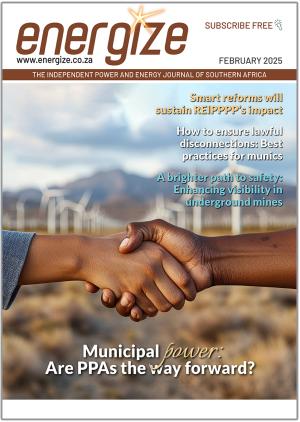by Jan Fourie, Scatec
South Africa's energy crisis is having a devastating impact on the country's economy, with GDP declining by 0,7% in the second quarter of 2022, according to Stats SA. Load shedding is affecting food security, infrastructure, and communication networks, as well as various key economic sectors, like mining, tourism, and manufacturing.
With abundant sunlight and wind resources, renewables present the optimal solution to our energy woes in South Africa. The urgency of the situation calls for increased private sector investment in renewable energy projects to fast-track the Department of Mineral and Energy Resources' Integrated Resource Plan (IRP) and accelerate our economic recovery, by embracing the worldwide transition towards clean energy.

The energy transition in South Africa has gained widespread public support, and the market may be looking to secure the necessary raw materials to fuel this shift in 2023.
The significant upscaling in the production of lithium-ion (Li-ion) batteries has made renewable energy price-competitive with fossil fuels, further driving the shift towards clean energy sources. However, the Covid-19 pandemic and the war in Ukraine have seen supply chain spasms affecting commodities like nickel – a key component for Li-ion battery production.
This could present an opportunity for South Africa's metal producers to fill the global supply gap, potentially emerging as a key player in the new global metals market, and simultaneously driving a just energy transition locally.
In addition, innovations in storage technology have allowed renewable energy plants to produce stable, consistent, and dispatchable power, dispelling the myth that renewable energy is intermittent, or unreliable.
Widespread investment into renewables, driven by strong tailwinds will offer businesses far more than a safety net against load-shedding. Brand differentiation, stable energy prices, and the opportunity to fulfil corporate sustainability targets are just a few of the other potential benefits for the private sector.
Embracing renewables is a key component of many successful businesses' corporate social responsibility strategies, and tends to herald strengthened stakeholder relations, including with the local community, customers, and employees.
New energy wheeling legislation and power purchase agreements will also help to alleviate pressure on the nation's energy supply. Scatec is constructing three projects in Kenhardt in the Northern Cape with a combined solar capacity of 540 MW.
Furthermore, as my colleague Stian Kalsen says, the introduction of the green finance taxonomy (GFT) is bringing a measure of standardisation and transparency to the process of classifying and scoring SA's green economic activities, helping facilitate a smooth equitable transition to a low-carbon, net-zero emissions economy.
The private sector in South Africa has a crucial role to play in driving the transition to renewable energy and leading the charge toward a cleaner, more sustainable future. With the growing public push for sustainability and the incentives and opportunities offered by new legislation, 2023 presents a golden opportunity for businesses to embrace renewable energy.
This will not only bring environmental benefits, but it also has the potential to drive economic development, create jobs, enhance energy security, and buffer against the threats presented by load shedding, which is not going away in the foreseeable future.
Dispatchable renewable energy is available in South Africa right now, and it makes sense for businesses to invest in it. Already massive projects are underway that promise to protect early adopters from load shedding-related risks and help bring South Africans clean power for the future.
Renewables are a safe investment option for businesses at the microeconomic level, and at the macro level, harnessing the country's abundant sun and wind resources could hold the key to future-proofing South Africa's energy sector.
As we move into 2023, we hope to see the private sector in South Africa shift gears and stake its claim in a cleaner, more sustainable future with significant buy-in to renewables.
Jan Fourie is the executive vice president for Scatec in sub-Saharan Africa















